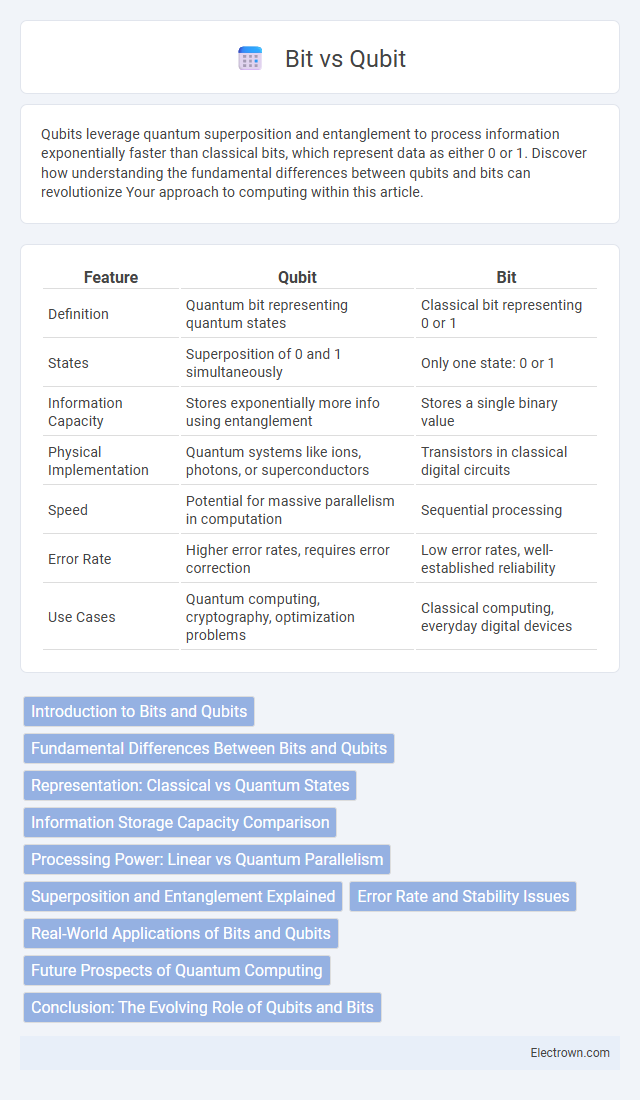Qubits leverage quantum superposition and entanglement to process information exponentially faster than classical bits, which represent data as either 0 or 1. Discover how understanding the fundamental differences between qubits and bits can revolutionize Your approach to computing within this article.
Table of Comparison
| Feature | Qubit | Bit |
|---|---|---|
| Definition | Quantum bit representing quantum states | Classical bit representing 0 or 1 |
| States | Superposition of 0 and 1 simultaneously | Only one state: 0 or 1 |
| Information Capacity | Stores exponentially more info using entanglement | Stores a single binary value |
| Physical Implementation | Quantum systems like ions, photons, or superconductors | Transistors in classical digital circuits |
| Speed | Potential for massive parallelism in computation | Sequential processing |
| Error Rate | Higher error rates, requires error correction | Low error rates, well-established reliability |
| Use Cases | Quantum computing, cryptography, optimization problems | Classical computing, everyday digital devices |
Introduction to Bits and Qubits
Bits are the fundamental units of classical computing, representing information as either 0 or 1, while qubits are the basic units of quantum computing, capable of existing in multiple states simultaneously due to superposition. Unlike bits, qubits leverage quantum phenomena such as entanglement and interference, enabling exponentially greater processing power for specific computational tasks. Understanding the differences between bits and qubits is essential for grasping the potential of quantum technologies and how they may transform your approach to complex problem-solving.
Fundamental Differences Between Bits and Qubits
Bits represent information as either 0 or 1, forming the foundation of classical computing, whereas qubits utilize quantum superposition to exist simultaneously in multiple states. This fundamental difference enables qubits to perform complex computations exponentially faster by leveraging entanglement and interference. Understanding these distinctions is crucial for advancing Your knowledge of quantum computing capabilities compared to traditional digital systems.
Representation: Classical vs Quantum States
Bits represent information as classical states, either 0 or 1, using electrical voltage or magnetic polarity, while qubits utilize quantum states that can exist simultaneously as 0, 1, or any quantum superposition of these states. Quantum representation leverages principles like superposition and entanglement, allowing qubits to encode exponentially more complex information compared to classical bits. Your computing tasks can achieve vastly enhanced parallelism and processing power through the unique quantum state representation of qubits.
Information Storage Capacity Comparison
Qubits store information using quantum states, allowing them to represent both 0 and 1 simultaneously due to superposition, which exponentially increases storage capacity compared to classical bits that hold only one state at a time. While a single classical bit encodes a binary value, n qubits can encode 2^n possible states simultaneously, vastly enhancing data storage and processing potential. Your ability to leverage quantum computing dramatically expands the capacity to handle complex information beyond traditional binary systems.
Processing Power: Linear vs Quantum Parallelism
Classical bits process information sequentially, representing either 0 or 1, enabling linear computational operations. Qubits exploit quantum superposition, allowing simultaneous representation of 0 and 1 states, which facilitates quantum parallelism and exponentially enhances processing power. This quantum parallelism significantly accelerates complex problem-solving compared to traditional linear bit processing.
Superposition and Entanglement Explained
Qubits leverage superposition, enabling them to represent both 0 and 1 simultaneously, unlike classical bits that hold only a single binary value at a time. Entanglement connects qubits in a way that the state of one instantly influences the state of another, regardless of distance, a phenomenon absent in traditional bits. These quantum properties empower qubits to perform complex computations exponentially faster than classical bits in fields like cryptography and material science.
Error Rate and Stability Issues
Qubits inherently suffer from higher error rates due to quantum decoherence and noise, causing instability in quantum computations compared to classical bits, which maintain near-zero error rates in stable digital circuits. Quantum error correction techniques and physical qubit designs aim to improve qubit fidelity but still face challenges achieving long coherence times essential for practical quantum computing. In contrast, classical bits operate reliably over extended periods with minimal error, making them fundamentally more stable for traditional data processing tasks.
Real-World Applications of Bits and Qubits
Bits serve as the foundation for classical computing, enabling real-world applications such as data storage, digital communication, and everyday software programs. Qubits, utilized in quantum computing, have transformative potential in fields like cryptography, drug discovery, and complex system simulations by handling massive data sets and performing parallel calculations far beyond classical capabilities. Your ability to leverage quantum algorithms could revolutionize optimization problems and enhance machine learning models in the near future.
Future Prospects of Quantum Computing
Quantum computing's future prospects hinge on qubits' ability to perform complex calculations exponentially faster than classical bits, enabling breakthroughs in cryptography, drug discovery, and optimization problems. Unlike bits that represent data as 0 or 1, qubits exploit superposition and entanglement, allowing simultaneous processing of multiple states and vastly increasing computational power. As research advances in error correction and qubit coherence, scalable quantum processors could revolutionize industries by solving problems currently intractable for classical computers.
Conclusion: The Evolving Role of Qubits and Bits
Qubits, harnessing quantum superposition and entanglement, offer exponential processing power compared to classical bits limited to binary states. As quantum technology advances, qubits are transforming complex problem-solving capacities in cryptography, optimization, and simulation. Your future computing landscape will increasingly depend on the synergy between classical bits for reliability and qubits for unprecedented computational speed.
qubit vs bit Infographic

 electrown.com
electrown.com